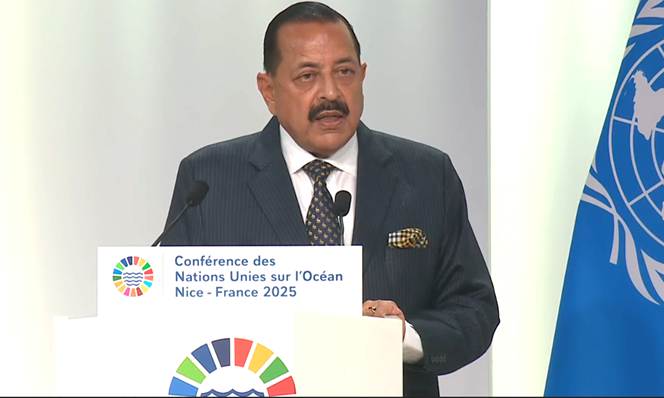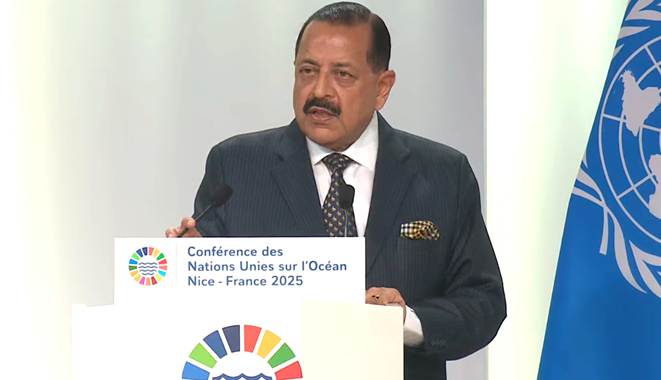Ministry of Earth Sciences
Dr. Jitendra Singh Pushes for Global Ocean Pact, Showcases Deep Sea Mission and Plastic Ban at UN Ocean Conference
$80 Billion Port Projects and $2.5 Billion Fisheries Boost: Minister Showcases Maritime Growth at UN Ocean Conference
From Coast to Deep Sea: India Unveils Multi-Pronged Ocean Strategy at UNOC3
Blue Economy Drives Coastal Growth: India Pitches Integrated Ocean Development Model on Global Stage
Posted On:
10 JUN 2025 5:50PM by PIB Delhi
India called for urgent global action on ocean health at the Third United Nations Ocean Conference (UNOC3) in Nice, with Union Minister of Earth Sciences (Independent Charge), Dr. Jitendra Singh pushing for global ocean pact and unveiling major strides in deep-sea exploration, marine plastic clean-up, and sustainable fisheries.
Representing India, Dr. Jitendra Singh highlighted progress on the Deep Ocean Mission’s upcoming manned submersible, a nationwide single-use plastic ban, and over $80 billion worth of Blue Economy projects. India also backed the swift ratification of the BBNJ Agreement, advocated for a legally binding Global Plastics Treaty, and launched the ‘SAHAV’ digital ocean data portal, underscoring its growing leadership in global marine governance.
Addressing the conference, which is co-hosted by France and Costa Rica under the theme “Accelerating Action and Mobilizing All Actors to Conserve and Sustainably Use the Ocean,” Dr. Jitendra Singh reaffirmed India’s commitment to Sustainable Development Goal 14: Life Below Water. He outlined how India’s initiatives are aimed at reversing ocean degradation through science, innovation, and inclusive partnerships.
A key highlight was the progress on the Deep Ocean Mission’s ‘Samudrayaan’ project, which is expected to deploy India’s first manned submersible by 2026. The project aims to explore ocean depths up to 6,000 meters and is seen as a major leap in India’s scientific capability.
Dr. Jitendra Singh also spoke of expanding India’s Marine Protected Areas, which now cover 6.6% of the Exclusive Economic Zone, contributing to global biodiversity goals.

On marine pollution, the Minister pointed to tangible outcomes from the ‘Swachh Sagar, Surakshit Sagar’ campaign, which has cleaned over 1,000 km of India’s coastline and removed more than 50,000 tonnes of plastic waste since 2022. The draft marine litter policy has been prepared, and India continues to support negotiations on a Global Plastics Treaty aimed at a legally binding international framework.
India’s Blue Economy efforts, led by the Sagarmala Programme and the Pradhan Mantri Matsya Sampada Yojana (PMMSY), were also showcased. Over 600 port-led infrastructure projects worth $80 billion have been operationalized, and investments of $2.5 billion have gone into modernizing the fisheries sector. The government reported a 10% rise in fish production and the creation of over 1,000 fish farmer producer organizations since the last UN Ocean Conference in 2022.
Emphasizing climate resilience, Dr. Jitendra Singh noted the restoration of over 10,000 hectares of mangroves and the implementation of shoreline management plans using nature-based solutions. India has also integrated ocean-based climate actions into its Nationally Determined Contributions under the Paris Agreement.

India’s growing role in global ocean governance was evident through its co-leadership in ‘Blue Talks’ with France and Costa Rica, and its active participation in high-level events such as the India-Norway side session on Marine Spatial Planning. The launch of the ‘SAHAV’ portal during the conference further adds to its credentials in promoting transparent, science-based ocean management.
Calling for a robust ‘Nice Ocean Action Plan’, Dr. Jitendra Singh urged the international community to invest in innovation, ratify the BBNJ Agreement, and finalize the plastics treaty. “The ocean is our shared heritage and responsibility,” he said, expressing India’s readiness to work with all stakeholders—governments, private sector, civil society, and indigenous communities—to ensure a sustainable ocean future.
The Indian delegation’s participation at UNOC3 signals a clear message: India is positioning itself not just as a coastal nation but as a proactive player in shaping global ocean policy.
*****
NKR/PSM
(Release ID: 2135434)
Visitor Counter : 994